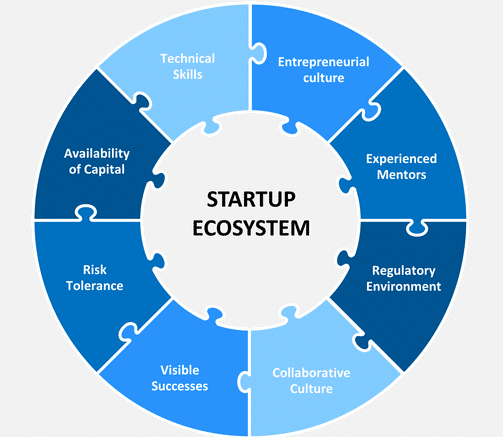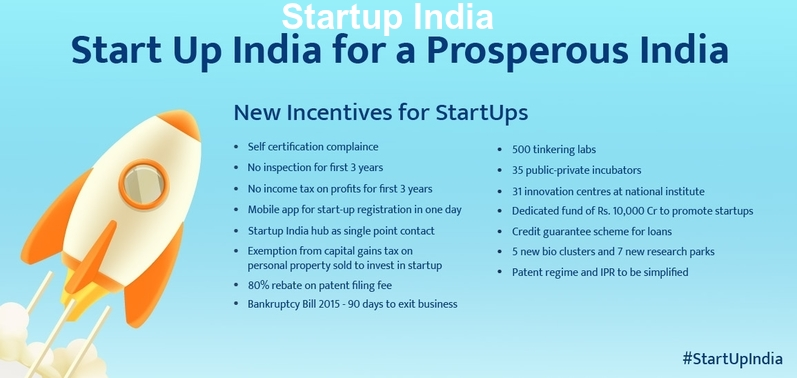Science & Technology
Startups In India
- 10 Nov 2020
- 9 min read
This article is based on “India is in the middle of a much-needed start-up revolution” which was published in The Hindustan Times on 10/11/2020. It talks about the issues and way forward related to the startup ecosystem in India.
In recent years, startups have been receiving increased attention in many parts of the world. In India, the number of startups has increased fast and more support has become available in all dimensions. It is due to vast commercial potential for startups, India is often described as “the poster child of emerging markets”.
Today Startups are being widely recognised as important engines for growth and jobs generation. Through innovation and scalable technology, startups can generate impactful solutions, and thereby act as vehicles for socio-economic development and transformation.
However, still there are many challenges that act as a hindrance in realising the true potential of startups in India.
Opportunities Available
India now has 38,756 officially-recognised start-ups – with 27 unicorns, eight of which achieved this status in 2020 – and is the third-largest tech start-up hub globally. Apart from it, India’s economy, demography and government’s active support provides a wide scope for establishing a thriving startup environment.
- Growing Indian Economy: Just before sudden disruption by Covid-19 pandemic, the Indian economy continued to grow and purchasing power was increasing steadily.
- As economic recovery is expected in the short-term, the rising consumption will be driven by the growth of upper-middle income and high-income segments of the population.
- Thus, the size of indian market provides ample opportunity for startups to grow.
- Favourable Demography: The demographics of the Indian population is another advantage. Half of the country’s population are below the age of 25 years.
- The nearly 700 million people born through the late 1980s to the 2000s carry material ambitions and have the ability to spend.
- This makes them a huge section of population that has the ability to absorb the innovative goods and services provided by startups.
- Active Government Support: Government of India launched the flagship initiative, “Startup India” in 2016. The program envisages to build a strong ecosystem that is conducive for the growth of startup businesses and kickstarted an entrepreneurship revolution.
- Further, the overhaul of the digital payments ecosystem is being led by State innovation (NPCI), with Aadhaar, Jan Dhan, UPI, and India Stack.
- As India improved its digital connectivity, market access barriers have been brought down and created a favourable ecosystem for startups.
- High Scope in Rural Areas: As the majority of India’s population still resides in rural areas, many startups have focused towards providing ease of living in rural areas. For example:
- FIA Global - with a network of 26,000 banking agents - is using Artificial Intelligence (AI) to deliver financial products and services such as remittance services and access to credit in rural areas, and has reached over 34 million customers.
- MFine provides an AI-powered health care platform for people to consult over 3,500 doctors.
- PharmEasy connects local pharmacy stores and diagnostic centres to verify prescriptions and deliver over 100,000 medicines.
Associated Challenges
- Issues Emanating From Regional Imbalance: India is a highly diverse country with a plethora of cultures, languages, ethnicities and religions.
- Due to this, the startups’ understanding of them is often limited to certain regions. In that sense, comparative advantages are linked to specific regions.
- Digital Divide: As nearly 70% of the Indian population lives in rural areas, the customers of the mass market tend to come from low-income backgrounds in villages.
- This often discourages many startups to come up with a pan-India approach.
- Issues of Funding: For running a startup, a significant amount of working capital is required. Many startups, especially at early stages, are bootstrapped, i.e. self-funded through the founders’ own savings, or using capital from friends and family.
- Hiring Challenge: For many job-seekers, joining a startup as an employee is not an attractive career option, due to the inherent risk that the startup might fail.
- In addition to this, many job applicants are not sufficiently skilled. Startups see a gap between the knowledge taught to students in colleges and the knowledge needed for the jobs, especially in sectors in which technologies change at a fast pace.
- Complex Regulatory Environment: The government of India has introduced policies that aim to ease the business environment for startups. However, the present regulatory framework in which startups operate is widely seen as difficult, inefficient and unpredictable.
- For example, the government has imposed “Angel Tax”, which was introduced in 2012 with the aim to thwart money laundering, but it also discourages investment in startups.
Way Forward
- Integration with School Curriculum: The National Education Policy, 2020 envisages to promote student entrepreneurs by offering vocational education in partnership with industries and introducing coding for schoolchildren.
- This can have a favourable impact on the startup ecosystem in India, if entrepreneurial skills are integrated with the education curriculum under new education policy.
- Bridging Digital Divide: There is a need to fill infrastructure gaps esp in rural areas, promote digital literacy and help people become more knowledgeable about the digital world. In this regard, the government initiative of Digital Saksharta Abhiyaan is a step in the right direction.
- Promoting Agri-Startups: As still the majority of Indian workforce is employed in agriculture, there is a need to clear roadblocks and promote agri-startups.
- The new farm acts give greater choice to farmers and incentivise start-ups to transform the agriculture value chain in storage, finance, transport, aggregation, and marketing.
- Startups in High-end Technology: The recently-released Draft Space Policy states that “Indian entities can undertake design, development and realization of satellites and associated communication systems.
- They can establish satellite systems through their own built satellite or procured satellite.
Conclusion
In present times startups in India are witnessing a golden chapter in the history of Indian entrepreneurship. However, still the indian government has a crucial role to play in positioning India as the Tech Garage of the World. It should act as a catalyst, and bring together the synergies of the private sector with the aim of innovating for India and the world.
|
Drishti Mains Question Startups are recognised as important engines for growth and jobs generation. Discuss various challenges that act as a hindrance in realising the true potential of startups in India. |
This editorial is based on “India and Biden: On post-Trump ties” which was published in The Hindu on November 09th, 2020. Now watch this on our Youtube channel.






